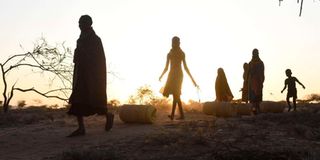Okumba Miruka: Accord widows the dignity they justly deserve

A widow and other residents of Kodekode village in Turkana County look for water on February 7, 2022.
What you need to know:
- Study shows that Kenya is among countries where widows are subjected to repugnant customary ‘cleansing’ practices like having sex with hirelings.
- Widows face cultural problems such as lack of access to land tenure, employment and/or livelihood, social safety nets, healthcare, and education.
- They also face harmful practices such as child, early and forced marriage, including levirate.
It is said that disability is a club you can join any time.
The same may be said of widowhood, whether it is from natural or accidental causes, as well as deliberate violence such as election-related conflict that rocks Kenya from time to time.
The statement is used to remind people not to despise or stigmatise vulnerable populations. Widowhood is a source of vulnerability, especially for women. Given that women outlive men, widowhood is feminised.
It is in this regard that there was jubilation on March 15, when the United Nations (UN) General Assembly adopted a resolution addressing the situation of widows worldwide.
Barriers
The celebrations were informed by a hope that member states of the UN will act to minimise the tribulations of widows.
The resolution recognises that “all aspects of life for widows in many parts of the world are negatively affected by various economic, social and cultural factors, such as lack of access to inheritance; land tenure; employment and/or livelihood; social safety nets; healthcare and education; and harmful practices, such as child, early and forced marriage, including levirate”.
Other disadvantages faced by widows are; subjection to discriminatory and violent mourning rites; forced marriage; unpaid domestic labour; economic hardship and exclusion; unemployment; hunger; malnutrition; poor access to healthcare services, water, sanitation and hygiene; gender-based violence; and illiteracy, with a snowball effect on the children cared for by widows.
The resolution notes that the Covid-19 crisis had “a disproportionately heavy impact on women and girls, and may have increased the prevalence of widowhood”, the same way HIV/Aids did.
This litany of woes is a replica of findings in the Loomba Foundation’s World Widows Report of 2016 that notes that Kenya is one of the countries in which widows are subjected to repugnant customary “cleansing” practices such as drinking “the water with which the dead husband’s body has been washed and to have sex with a relative” or hireling and even forced intercourse with the husband’s corpse.
It is also listed among nations where widows are routinely accused of “killing their husbands either deliberately or through neglect” and are disinherited and evicted from their homes.
Many are the cases where widows of HIV-infected persons were accused of their deaths because of ignorance of the disease.
Discrimination
The resolution calls upon member states, the UN system and other international and regional organisations “to urgently address all forms of discrimination, violence, marginalisation, stigmatisation and exclusion experienced by widows”.
It also seeks to have widows included in all decision-making processes, without discrimination of any kind.
In recognition of disinheritance of widows, it calls for registration of all marriages to legitimise and formalise their claim to property.
Member states are also asked to establish comprehensive social protection systems targeting widows and their dependants, and eliminate legal barriers to their rights to property, inheritance and decent work.
This resolution echoes Article 20 of the Maputo Protocol, which asks African states to take appropriate legal measures to ensure widows are not subjected to inhuman, humiliating or degrading treatment; automatically become the guardians and custodians of their children; and have the right to remarry the persons they choose to.
It also reminisces of UN Resolution 65/189 of 2010 that declared June 23 the International Widows’ Day, thus giving visibility to the matter.
UN resolutions are formal expressions of opinion or will. Although they are not binding legal documents, resolutions have the moral authority of galvanising member states towards action on a theme considered globally important.
They also provide a framework that member states can use to come up with action plans about the issue.
Rights
No doubt, this resolution gives women’s rights organisations fresh impetus to advocate that widows be accorded the dignity they deserve.
Regrettably, this resolution talks about gender mainstreaming but actually focusses only on widows, thus betraying the mistake of regarding ‘gender’ as a synonym for ‘women’.
The World Widows Report notes that there are an estimated 258,481,056 widows globally, with the numbers rising because of conflict. One of seven of these widows lives in extreme poverty.
It further reports that widowhood affects even girls because of child marriages, which are still common in Africa. The report estimates that there were 1,424,689 widows in Kenya in 2015. This number has obviously increased.
A search for national statistics on this phenomenon is fruitless, betraying deficient investment in creating comprehensive demographic data.
The resolution recognises that such dearth of “high-quality, reliable, timely and disaggregated data on widowhood and particular information on the needs and roles of widows… prevents comprehensive and useful analysis and policy action”.
One hopes that the Kenya National Bureau of Statistics will find it necessary to conduct a census of widows as part of Kenya’s response to this resolution.
Dr Miruka is an international gender and development consultant and scholar ([email protected])





